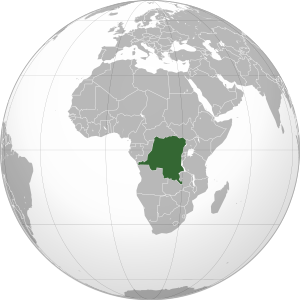A First For Congo: Local Elections Announced for 2014
 |
| English: DRC, orthographic projection. (Photo credit: Wikipedia) |
via Enough Team on Nov 26, 2013
In early October, the Democratic Republic of Congo’s Independent National Electoral Commission, or INEC, declared the release of a roadmap for the 2013-2016 election cycle on November 8, 2013. While a full roadmap was not released to the press on November 8, the INEC met with delegates of political parties in the People’s Palace to discuss future elections. Father Apollinaire Malumalu, President of the INEC, announced that the electoral process will begin with local, municipal, and city elections in 2014 and presidential elections in 2016 and that the INEC has undergone major transformations in order to ensure a more credible and fair election process. Specific dates for elections are set to be published at the beginning of each fiscal year.
Elections in the DRC have long been rife with chronic mismanagement, violence, and fraud. The closed polling stations, the rigging of and freely circulating ballots, intimidation tactics, and attacks on voters in the 2011 presidential and legislative elections left newly elected President Kabila mired in widespread public mistrust and lacking credibility. Father Malumalu said that since August, the INEC has reviewed issues related to the electoral process and taken steps to resolve them, including holding training seminars for members of the INEC administration on the electoral process and management of electoral disputes, redefining the INEC structure, and beginning consultations with the public on the development of a project roadmap.
Consultations began in October as the INEC held a series of meetings with political parties and civil society representatives in order to get their feedback and input on future elections. These consultations along with a National Democratic Institute conference resulted in a set of recommendations for INEC to inform the anticipated report. They aim to avoid serious breaches that occurred during the 2006 and 2011 elections and ensure new rights, including suffrage for the Congolese diaspora and consultations with stakeholders on the electoral process.
The announcement of 2014 elections and the involvement of civil society and political parties in consultations is groundbreaking. This will be the first time in Congo’s history that local elections take place. It is a welcome development, with the power to shift Congo’s security and governance landscape significantly. Local elections are the lynchpin of stability as the country moves into a new political climate of peace. Communities in Congo need dispute resolution mechanisms and strong leadership will be a key mechanism to prevent spiraling back into conflict. Additionally, Congo can only deal with high-profile issues like child soldier reintegration, land redistribution, and amnesties for low-ranking rebel fighters with a functioning local governance structure. People need fairly-elected leaders to deliver basic services, represent them in regional or national meetings, and resolve disputes lingering from decades of violence and heated division.
It is too soon to tell if Malumalu’s announcements will materialize. Some related proposals are cause for alarm, including a reform that would allow locally elected leaders to in turn elect governors and national senators, a model vulnerable to rampant corruption.
But even more worrying is the formation of a new government of national cohesion, which many observers think bears risks. Kabila’s new majority from the recently held consultations might agree to reviewing the constitution or their consensus could grant him a third mandate beyond 2016. Also, by delaying the population census necessary for holding elections, they might postpone the 2016 presidential elections. Alternatively, they might cite financial constraints as an excuse to cancel the elections. Thus, it will be paramount for the international community to press the president to abide by the constitution and hold genuine elections in 2016.
But prior to presidential elections, fair and transparent local elections and governance reform in Congo will require a great deal of support from the international community, including observers, infrastructure, equipment, and reporting. International donors must improve their coordination and the World Bank should crystallize their strategies for how their 2014 grants will align with and fortify this massive step forward for Congolese communities.
